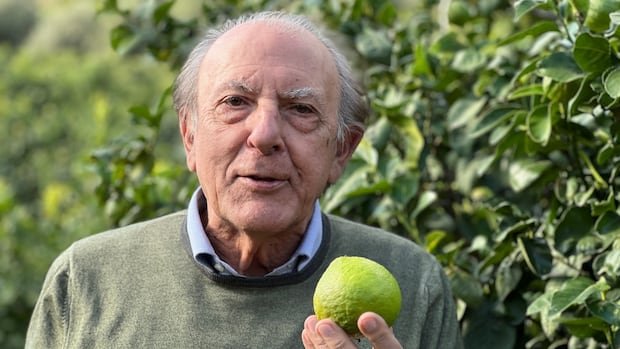Popular Italian poet Gabriele D’Annunzio is famously credited with describing the view from Reggio Calabria’s promenade, where the Mediterranean and Ionian Seas meet, as “the most beautiful kilometer in Italy.”
But beyond the breathtaking vistas, the mingling of seas and the unique microclimate created by the tapering Apennine mountain range provide idyllic conditions for the citrus fruit bergamot.
Grown for centuries almost exclusively along a 55-mile stretch of the Ionian coast, the toe of Italy’s boot, the fruit’s essential oil is a valuable ingredient in perfumes, luxury cosmetics and even Earle Gray tea, sought after for its complex, citrusy notes is scent notes and the ability to fix scents on the skin.
“It’s a miracle of nature,” said Ezio Pizzi, president of the Bergamot Consortium, which was granted coveted Protected Designation of Origin (DOP) status for the essential oil by the European Union in 2001.
“Imagine this plant was brought from Sicily and planted here, 15 kilometers away, in this incredible microclimate that gave it incredible properties.”
Over time, the Calabrians discovered the many benefits of the oil extracted from the peel of the still-green fruit – from repelling mosquitoes and flies to acting as a powerful disinfectant to improving the longevity and spread of a scent.

However, in the late 1960s, the invention of synthetic oil caused the value of natural bergamot to decline, resulting in landowners having to cut down their trees. Bergamot cultivation was stopped in the region for almost 25 years.
Then, in the early 1990s, the rise of organic products sparked new interest, particularly among French perfumeries. Pizzi, a member of one of the few landowning families that had not destroyed their orchards, brought together a group of producers, resumed essential oil production, and formed a consortium.
“We were able to double the price from 18 cents a liter to 36 cents in the first year,” he said. “We now achieve up to one euro per liter.”
Today, says Pizzi, the DOP area of Calabria produces 80 percent of the world’s bergamot.
But until just over a decade ago, the pulp was thrown away and mostly fed to animals.
Valuable juice, once demonized
“I grew up with my mother telling me that if I ate bergamot my hands would fall off,” said Vittorio Caminiti, a local historian and founder of the small, cozy National Bergamot Museum, The hotel is located up a flight of stairs on a side street in Reggio Calabria.
Criminiti says wealthy landowners demonized the fruit juice, claiming it was poisonous, to discourage local farmers from consuming it, thereby ensuring that the bergamot crop for oil production remained exclusively in their control. Before industrialization He says it took 400 bergamots to make just one liter of oil.
“If someone had died? He would have eaten a bergamot. If a woman had a miscarriage? She would have eaten a bergamot. Every disease was attributed to bergamot,” he said. “There were too many trees to patrol, so instead of arresting or beating people for eating them, they created a myth.”
In the mid-1990s, Caminiti began experimenting with the juice and eventually realized he needed to wait for the bergamot to ripen, until it was orange enough to eat or drink. He entered a competition with a cake he baked with bergamot juice and took home the top prize.
Culinary media in Italy picked up the story and expressed outrage or disbelief.
“I gave them bergamot recipes, then they called the head of the Bergamot Consortium, who told them I was crazy,” he said.
Health benefits
Soon after, the first scientific studies were carried out in Italy showing that bergamot juice lowers blood pressure Cholesterol, and later ones showing potential for the treatment of diabetes.
The discovery of the juice’s health benefits has brought new producers to the market, such as Fabio Trunfio, 50, who runs the Patea Bergamot Agricultural Company – a 20-minute drive from Pizzi’s groves.
Trunfio entered the bergamot oil market in 2007 and expanded production to include juice and fruit sales in 2010.
Frustrated by the failure of Pizzi’s Bergamot Consortium to vigorously promote the juice, he has joined other producers in an attempt to introduce its own, separate EU designation: Protected Geographical Indication (IGP).
IGP, like DOP, focuses on the regional reputation of the product, but offers more flexibility in ensuring authenticity.
Trunfio and his group are also applying for IGP certification.
“Once we receive our IGP, we can promote the amazing properties of Calabrian bergamot juice,” Trunfio said, “and ultimately obtain a government certificate certifying the cholesterol-lowering properties of bergamot juice.”
However, the head of the DOP consortium, Ezio Pizzi, questions Trunfio and others’ plan for an IGP – he is trying to maintain control of the product through the more exclusive DOP, which he believes is justified. He complains that the region’s new producers are flooding the market and driving down prices – already hit when duty-free perfume sales stalled during the pandemic – even further.
As Calabria’s bergamot producers fight for control of their brand, the larger issue of climate change is coming to the fore. Concern is growing across Italy about the vulnerability of monoculture agriculture, evident in everything from vineyards to Olive groves.
But extreme summer temperatures and changing rainfall patterns have hit southern Italian citrus growers particularly hard. Last summer, intense heat and drought in Sicily turned oranges and lemons into hard, shriveled nuts, with yields falling by up to 40 percent.
So far, Calabria’s groundwater reserves have been sufficient to compensate for the lack of rainfall and only a tiny proportion of the fruit has suffered from the heat. But producers warn that could change.

“We usually stop watering in September,” Pizzi said. “It has barely rained a drop this year and for the first time in as long as I can remember we are still watering in December.”
He says he is currently in discussions with regional politicians about setting up desalination plants or using gray water from sinks, showers or washing machines for irrigation.
But unless something is done soon, Calabria risks losing its hard-won wealth once again.





